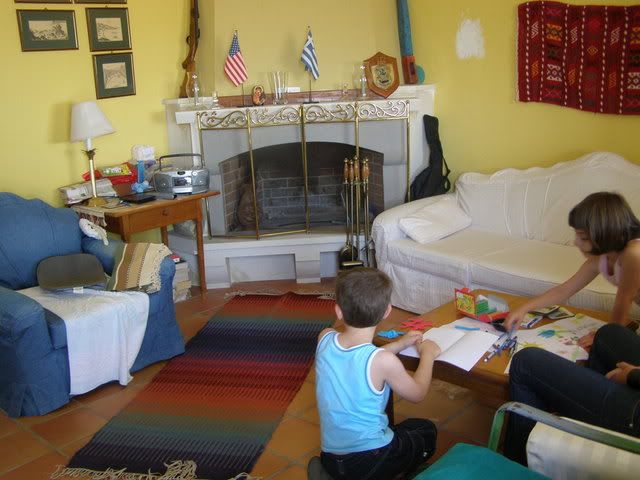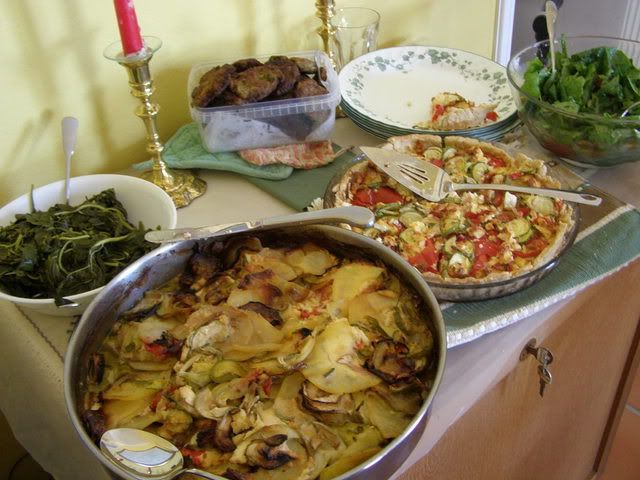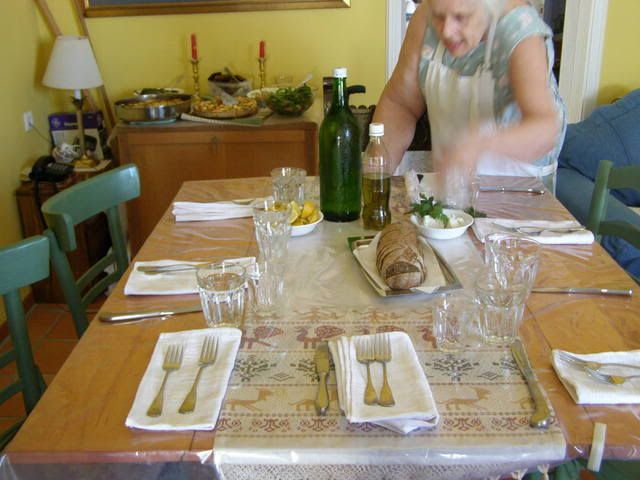View Larger Map
The dietary habits of an American family of French Huguenot descent living in a village in Hania, Crete
INTRODUCTION:
People's dietary habits differ all over the world, with the result that when they leave their home territory, their dietary choices may not be available in their new place of residence. This invariably results in replacing food items that cannot be sourced in certain parts of the world with a foreign equivalent, or in extreme cases, doing without.
Kentucky Fried Chicken (KFC) is well known all over the world, but not in Hania, Crete. What happens when an American family from Louisville, Kentucky (don't pronounce the 's'), the headquarters of KFC, comes to live in Kolimbari, Chania (don't pronounce the 'C'), where KFC does not (yet) exist?
How will their dietary habits change? What substitutions and replacements will have to be enlisted in order that their daily dietary KFC doses will not suffer adversely? Is it possible for a Kentuckian to survive on the Mediterranean diet?
LITERATURE REVIEW:
The rates of obesity in the USA are constantly under discussion. The situation is being treated as an epidemic by many specialists: unhealthy diet coupled with lack of exercise and an addiction to sedentary activities, notably the internet, have led to a decline in the health of the average Americans.
In The Omnivore's Dilemma (2006), Michael Pollan points out that the average American's diet consists of corn-based food products, most of which are prepared in industrial kitchens (hence the term "industrial eater"), the kind usually served in fast-food outlets and store-bought ready meals, and eaten mainly by sitting on a couch watching television or in a fast moving car. Houses are even designed with a non-functional kitchen and just a microwave oven to heat up ready food (as Joanna Blythman claims in Shopped). Corn is fed to animals used in the consumer food market, such as chicken and beef, staple parts of the American diet. It is also used in other food products in the form of flour, preservatives and other food-related ingredients, even in the pesticides that are used to ensure a healthy bushel of corn. The problems inherent in such an agricultural system are mainly those related to non-sustainability and the cruel nature of growing food for fuel instead of starving people.
This is in stark contrast to the diet practiced by many residents of Crete, in accordance with the food pyramid of the Mediterranean diet (Verivaki, 2007-2008). Although supermarkets in Crete do sell prepared food in cans and plastic containers, it is not available in great quantities, nor is it treated as a staple food source. Fast food outlets do abound on the island, so it is expected that a Kentuckian will be using their facilities as a meal replacement service, given the absence of KFC.
While Americans source their food in supermarkets and the likes of McDonalds and KFC, the Cretans subsist mainly on local food which they have grown and harvested themselves. Although television features in various degrees of priority in both locations, there would be very few homes in Crete which do not own a table large enough for one's family to dine on, despite the fact that this worrying trend has been seen to intrude i various households on the island.
The purpose of this thesis, oops, sorry, I meant post, is to provide a descriptive account of the food lifestyle of the Hanioto-Kentuckians.
MATERIALS AND METHODS:
The data used in the thesis (of course, I meant the post) were gathered through the use of:
- casual interviews with the subjects (n = 2, no males)
- a meal prepared by the subjects in their Cretan home
- the contents of the subjects' fridge
- foods from the Mediterranean diet range presented to the subjects
1. What do you do for a living? (Sedentary jobs, no doubt...)
S1 is an occupational therapist, while S2 needed new kneecaps and hips, no doubt partly due to the archaeological digs she has been participating in for the last 25 years. There isn't a moment to sit around...
2. When you are in Crete, what physical exercise do you take? (I'll bet it's the gym...)
S2 has been swimming all her life, even though she doesn't live near the sea. She first crossed a river close to her home in Pennsylvania when she was only four years of age. S1 swam before she could walk because her mother (S2) was worried she might fall into someone's swimming pool and drown herself, so she taught her how to swim form a young age. They are both able to tackle Kolimbari Beach, which is very stony and deep, playing host to a dangerous riptide every now and then. S2 has also been known to hose down neighbours who spray her freshly washed laundry with water mixed with concrete from their newly constructed house. Although the subjects are both very active, they did not partake in the tomato pelting fight which took place between two neighbours; they were very thankful guns were not used instead.
3. How far away is your local 'fastfoodadiko'? (This place sure looks like the wop wops...)
Neither S1 nor S2 have any idea where the local souvlatzidiko is. They must miss KFC a lot.
4. Where do you eat your meals? (Oh, shit, there's a table in here...)
All meals are taken on a Shaker-design table which S2 made herself. In fact, all the furniture in their home is hand-made Shaker-style by S2, including a rug, made on a traditional Cretan weaving frame, called an argalio, and the covers of the living room suite.

5. Where do you source your food when living on the island? (I mustn't lose my focus...)
"We grow our own weeds," they proudly told me. The garden contains lettuce, peppers and glistrida (purslane). Basil decorates the balcony as a pot plant (and I can smell it cooking in the kitchen).

6. What do you keep in your fridge? (I'm curious...)
Apart from a carton of juice and some containers full of cooling water, half the fridge had been invaded by a 15-kilogram watermelon. There were also an incredible number of corked wine bottles in the fridge, all of which have been presented as gifts (but never imbibed) from friends passing by to see them in their Cretan home in Grimbigliana, a hamlet of the coastal village of Kolimbari, west of Hania. The house itself was part of a former Turkish court, of which the fortifications and the stonework of the court, dating back to the 1700s, can still be seen today, against a background of terraced fields where wheat was once grown.
7. How often do you eat meat? (Not a cow or chicken in sight...)
Despite expecting otherwise, no corn-fed cows were to be found in the vicinity of the house. S1 is a vegetarian; she only eats chicken when she goes out for dinner in Crete and their Cretan friends deliberately over-order, as they regard her as under-fed. S2 is tired of cooking after mothering four daughters and would love to eat something cooked by anyone else other than herself. Her youngest daughter, also a vegetarian, has just had the healthiest grandchild S2 has seen so far, over 9lbs. (The answer to this question has obviated the need to ask how long it's been since the subjects had KFC).
8. Can you name these foods? (Worth a try...)
"Oh my God, you bought us some horta! Oh, you didn't bring a boureki, did you? You made courgette patties especially for us?"

9. What are we eating today? (I'm hungry...)
S2 made a tomato and courgette quiche, using a Southern recipe for the crust. It had a sprinkling of basil on it, an unusual herb for Crete. Anne whipped up a green salad with red peppers. There was also anthotiro, a soft white local variety of Cretan cheese, and multi-grain bread from Drandakis bakery in Akrotiri.

10. Why do we need two forks, Mum? (Thanks for the question, Aristotle)
I don't know, son.
11. Hey, what's that gun doing over the fireplace? Do they go hunting? (???)
Oh, go ask Alice, please, Dimitri.
12. How on earth does S1 keep so slim? (If I ask this one, I'll only be drawing attention to myself...)
DISCUSSION:
Tomato quiche with Mama's crust is finger-lickin' good.
I must remember to take back my baking tin.
The framed flag on the wall travelled from England (as a scarf on an RAF soldier's neck) to Greece, to the USA, and back to Greece again; the rudder to the right of the fireplace is from a boat owned by a friend who also owned the gun (it doesn't work).
Is there a Shaker furniture store in Hania?
Who's your daddy?
CONCLUSION:
The Mediterranean cuisine has had no effect in the dietary habits of the Kentuckians surveyed, although this must be verified with a greater sample size. Future research could focus on the availability of Cretan food in Kentucky, as this is what is actually eaten by the subjects where they live most of the time...
ACKNOWLEDGEMENTS: I am indebted to Anne Clarke and Alice (not her real name) for inviting me to lunch at their home in Grimbigliana, Kolimbari, Hania, Crete. Happy 4th of July, everyone!
©All Rights Reserved/Organically cooked. No part of this blog may be reproduced and/or copied by any means without prior consent from Maria Verivaki.
Great memoir Maria, I am drooling over the food BTW!
ReplyDeleteIt seems that those Kentuckians defy stereotypes of Americans.
ReplyDeleteAlthough, as you know, I am very much in favor of a natural, vegetable-based diet, I also think that the "obesity epidemic" is a myth. It's a political myth used to justify the diet industry and hatred of "fat" people. It is accompanied by a complex web of false ideas, such as that obesity is unhealthy, thinness is healthy, obesity is the result of overeating, obesity is a terrible risk to human life, obese people use more public resources than other people, etc, etc. All bullshit.
What you and other Europeans may not know is that in 1998, the U.S. government changed the standard it used to determine who was and was not "obese." Overnight, suddenly thousands of people who had not been considered "obese" under the old guidelines, were declared obese, unhealthy, etc. Since that time, a wave of anti-fat propaganda has risen in this country, to the point where it now nears hysteria. There is no obesity epidemic.
Ha ha! Great thesis, I mean post, Maria!
ReplyDeleteHmmmm, sorry to say, a little too anecdotal and not enough facts. Just playing into unrealistic and unfair stereotypes, that have obviously influenced you. See how it can happen?
ReplyDeleteSourcing food at McDonalds and KFC, that's a new one :) Original?
this post has surely helped to dispel the rumours that abound in the european press about obesity in the usa
ReplyDeleteif you want more information about this issue, read Sandy's blog at http://junkfoodscience.blogspot.com/
for more information about the obesity myth. i myself am classified as overweight, and i don't even feel fat.
on the other hand, there is yoni's blog at http://bmimedical.blogspot.com/, who believes that there genuinely is a some kind of health/obesity problem.
I am a huge believer in eating lovally when on holiday. If you want McDonalds and what you crave every day then stay at home. I do admit to having a McDonalds hamburger when I was in Greece. We stopped there for a break and I decided to check out the menu which caters to Greek tastes with patates and Greek salad along with the burgers and fries.In Holland they served Mayonnaise for the fries.
ReplyDeleteVery funny research paper!
ReplyDeleteI've never liked fast food even as a kid, never eaten at McDonalds (though went in one once in a bad NYC neighborhood to use the bathroom), walk regularly, avoid sweets, don't drink, and eat healthily, yet I've turned into a big fatty. It's embarrassing, but such is my fate. There are many complex factors that lead to obesity, and there is no single fix that works for all people. And, yes, I know you know that!
Writing as The genuine youngest (yet not so skinny) veggie daughter of "S2" & mother of said uber-healthy grandson... I haven't had KFC in DECADES!
ReplyDeleteAmerica really suffers from the horrors of over processed foods & more convenience than activity.
Don't even get me started about "High Fructose Corn Syrup", either!
That "non food" only sneaks in as an import to Crete...
Anyhoo, we loved your "scientific" post here in Kentucky. Thank you for letting the world know my Mother's pastry crust is The Greatest! (Oh, yeah, don't forget Muhammad Ali is from Louisville, too!)
thanks to all for adding to the dialogue. i only wrote the post to entertain very good friends, but it seems to have generated some kind of heated debate.
ReplyDeleteno one can deny that the whole of the developed world suffers from having access to too much food and not enough activity.
there is also an undeniably illogical distribution of food in the world, most of it being available to people who already suffer from over-eating.
my greatest fear is that food will suddenly become too expensive to produce myself because of its importance in the fuel industry. when that day comes, this post will be just another part of the history of the world as we knew it, the way we lived it but cannot return to.